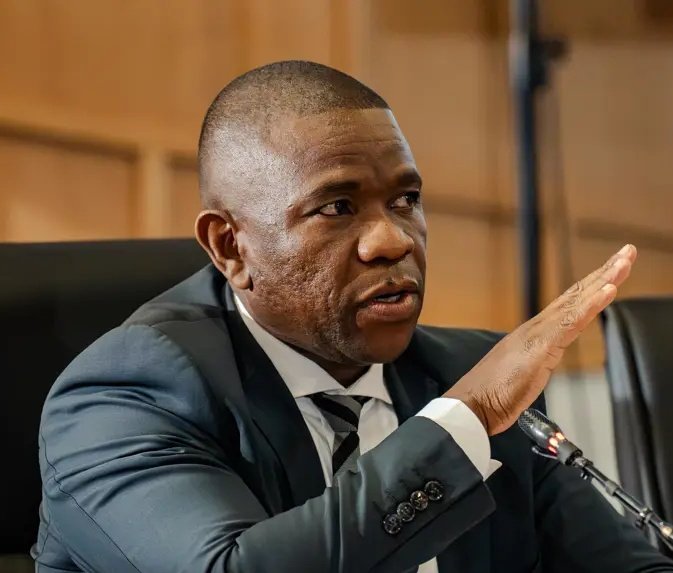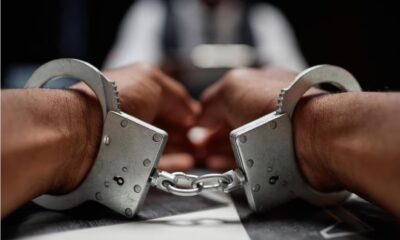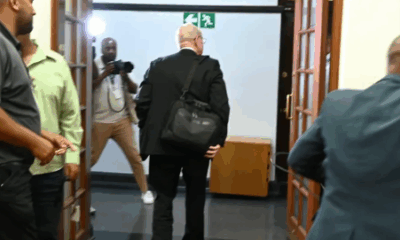News
When Trust Fades: How Corruption Is Eroding South Africa’s Police

When Trust Fades: How Corruption Is Eroding South Africa’s Police
Across South Africa, from the bustling townships of Gauteng to the remote villages of Limpopo, there is a growing consensus: the police can no longer be trusted. New revelations, from Lieutenant General Nhlanhla Mkhwanazi’s explosive claims of criminal networks infiltrating SAPS to the Madlanga Commission’s findings, are shaking public confidence once again, but this time, the reaction is not shock. It’s fatigue.
“We are fatigued by repetition,” says Siyabulela Jentile, president of #NotInMyName. “South Africans are not numb by choice; we are fatigued by repetition. Each revelation of corruption lands on ground already scorched by previous scandals from state capture to failures in local governance. When accountability becomes the exception rather than the norm, outrage slowly turns into resignation.”
For Jentile, the consequences of a compromised police service extend beyond lost trust. “People no longer see the police as protectors but as an extension of a state that has lost moral authority. In townships and rural areas, residents feel safer calling community patrols or neighbourhood-watch groups than reporting crimes to SAPS.”
He warns of a far-reaching ripple effect: “A compromised police service doesn’t just fail to solve crimes; it incubates criminality. It gives organised syndicates, drug networks, and corrupt officers room to operate with impunity. It means gender-based violence cases go uninvestigated, children disappear without trace, and communities resort to vigilantism.”
A Nation of Spectators
Melusi Ncala, Senior Researcher at Corruption Watch, paints a sobering picture. “It’s tragic. It is deeply worrying because it shakes the foundations of a democratic society. The police service is an institution we all have to interact with, from getting documents certified to opening criminal cases. When that institution is broken, democracy itself is weakened.”
He notes that the public’s apparent apathy stems from years of repeated disappointment. “We’ve had ministers, commissioners, and task teams promising clean-ups year after year, yet crime and corruption persist. Community members report drug dens and instead get threatened by the very officers meant to protect them. The problem is not new we’ve been raising it for years.”
Even Parliament’s ad hoc committee hearings, Ncala says, often serve more as political theatre than a serious quest for accountability. “When you look at the spectacle in Parliament, even though some influencers outside Parliament would tell you it was engaging with Lieutenant General Mkhwanazi, the politicians were really engaging in gossip or political issues as opposed to really delving into issues that really, really matter. The ad hoc committee needs to compile a report and address the veracity of claims, not entertain or obfuscate.”
Communities Now See Police as Criminals
Renowned security strategist Andy Mashaile, a retired Interpol ambassador, describes a society that has grown distrustful and wary. “The erosion of trust means people have given up on anything to do with the police. Communities now look at the police as criminals. Anything involving SAPS is a no-brainer, they simply expect failure or corruption.”
Mashaile points to the human cost of this breakdown. “Even when something drastic happens, it takes a long time to feel it. People do not trust the police, hence you find even a serving lieutenant general being suspected of working with criminals.”
For many South Africans, following senior officers being grilled in Parliament is less about justice than curiosity. “People are not expecting reform, they are just hoping someone goes to jail,” he says. “They have lost faith that these inquiries lead to change.”
The consequences of lost trust are visible on the ground: revenge killings in the Eastern Cape and KwaZulu-Natal, mob justice in Limpopo, and communities taking the law into their own hands. “When people stop trusting the justice system, they take the law into their own hands. The result is a collapse not only of policing but of belief in justice itself, a corrosion that spreads across our society and even across the SADC region,” Mashaile warns.
A Familiar, Painful Pattern
From Madlanga Commission hearings on institutional capture to Mkhwanazi’s allegations and Parliament’s public inquiries, one pattern emerges: deep-rooted corruption is embedded in institutions meant to protect citizens. Analysts note that the real story now is not just the corruption itself but how ordinary people have adapted emotionally to it. Years of broken promises and unresolved inquiries have cultivated a nation exhausted, not indifferent.
Community Policing Forums in Gauteng, Limpopo, and Mpumalanga report a collapse of trust and collaboration. In rural areas and informal settlements, residents say reporting crimes often amounts to futility: suspects are tipped off, and cases vanish. The erosion of trust has created parallel systems, communities fending for themselves while police credibility decays.
Trust in Numbers
Afrobarometer’s 2024 study confirms what citizens feel: six in ten South Africans believe “most or all police officers are corrupt,” while only a third trust the police. The Institute for Security Studies reports a sharp decline in public confidence over the past decade, and HSRC surveys indicate trust levels are at their lowest since 1994, even as fear of crime rises.
Civil Society Demands Consequences
Groups like Corruption Watch and #NotInMyName are calling for a shift from commissions to consequences prosecutions, independent oversight, and protections for whistle-blowers. Police unions POPCRU and SAPU acknowledge corruption as a “cancer that must be confronted” while defending honest officers. President Cyril Ramaphosa has vowed that Madlanga Commission findings will guide reforms, but public skepticism remains high.
Exhaustion, Not Indifference
From civic activists to security experts, the message is clear: South Africans are not indifferent; they are exhausted. As Jentile observes, “Our democracy is not collapsing; it is calling for renewal. That renewal begins when honesty becomes as courageous as protest once was.”
Whether this cycle of revelations will finally spark meaningful change remains uncertain. But one truth is undeniable: when corruption no longer shocks us, it has already claimed more than institutions, it has claimed the nation’s expectations.
{Source: IOL}
Follow Joburg ETC on Facebook, Twitter , TikTok and Instagram
For more News in Johannesburg, visit joburgetc.com


























